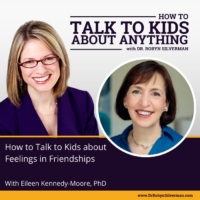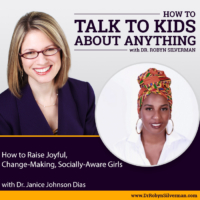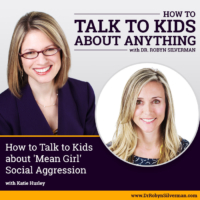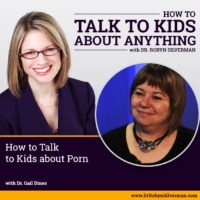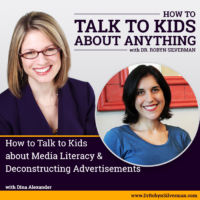Podcast: Play in new window | Download
Subscribe: Apple Podcasts | RSS | More
How to Talk to Kids about Making & Keeping Friends
This podcast focuses on how we can help kids make and keep friends while also helping them learn how to be a good friend to others. Based on Dr. Eileen Kennedy-Moore’s new book, out THIS week: Growing Friendships: A Kid’s Guide to Making and Keeping Friends, Dr. Kennedy-Moore provides specific tips and scripts to help guide children in friendship skills. The key adults in the lives of children, including parents, coaches, educators and other family members, learn how they can support children in maintaining healthy friendships that can be the foundation for other relationships throughout their lifetimes.
Special Guest: Dr. Eileen Kennedy-Moore
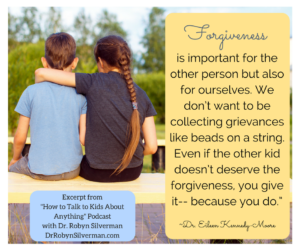 Friendship can be a beautiful part of life. We laugh, cry, play, talk and experience life with friends as we grow up. I mean, thinking back to your childhood, no doubt there are many moments that many of us can remember that involve friends. But that doesn’t mean that friendship is a simple construct. There are important skills that kids must develop in order to make and keep friends. How do they make friends? How do they learn to understand their friend’ feelings? How do they learn be part of the group and still maintain their own individuality and how do they let go to forgive or even more on from a friendship? For these questions, we are turning to Eileen Kennedy-Moore, PhD
Friendship can be a beautiful part of life. We laugh, cry, play, talk and experience life with friends as we grow up. I mean, thinking back to your childhood, no doubt there are many moments that many of us can remember that involve friends. But that doesn’t mean that friendship is a simple construct. There are important skills that kids must develop in order to make and keep friends. How do they make friends? How do they learn to understand their friend’ feelings? How do they learn be part of the group and still maintain their own individuality and how do they let go to forgive or even more on from a friendship? For these questions, we are turning to Eileen Kennedy-Moore, PhD
This podcast provides:
- Tips for how key adults can help kids be a good friend, make friend, keep friends and look for friends in their lives
- Steps to help kids learn about friendships
- How to greet a new friend with a personal greeting
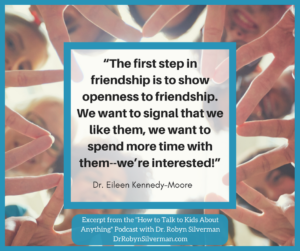
- How to watch and blend
- What friendship situations could be role played
- How to help kids pick the right people for them based on common ground
- How to help kids deal with conflict
- What to say when your child is in a conflict with a peer
- Forgiveness guidelines and how to forgive
- Signs that our children don’t need help in friendships
- What to do or say to help a child when the child is put in the middle of two friends.
Important Messages:
- We can’t make friends for our kids but we can help lay the groundwork.

- Key adults must model how to be a good friend.
- Children need to learn that the way to approach adults is different than the way to approach children.
- We must help kids look for common ground to help fuel the beginning of friendships.
- There is a very specific sequence to joining a group.
- Making and keeping friends is about focusing on others rather than drawing attention on oneself. We must help kids to learn how to match the enthusiasm, interest or emotional tone of the group.
- It’s not about being fake but being sensitive to other people’s feelings.
- Similarity is what pulls friendships together.
- We can help a child understand and what to do when they hear someone’s stop signals.
Notable Quotables:
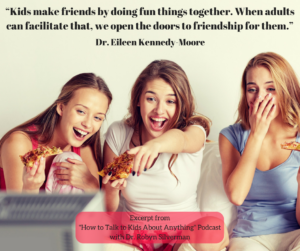 “We can’t make friends for our kids but we can definitely lay the groundwork and smooth the way for them to make those all important relationships.”
“We can’t make friends for our kids but we can definitely lay the groundwork and smooth the way for them to make those all important relationships.”- “What fuels the shift the friendships of the little kids to the deeper and more loyal friendships of the older kids is an increasing ability to understand and care about somebody else’s perspective.”
- “We want to help kids…approach with a compliment or ask interested questions like because this shows interest and is building on common ground which is where friendships begin.”
- “The first step in friendship is to show openness to friendship. We want to signal that we like them, we want to spend more time with them, we’re interested!”
- “Friendship is not about being fake, it’s about being sensitive. It’s about being aware of other people’s feelings and joining them.”
- “Kids make friends by doing fun things together. When adults can facilitate that, we open the doors to friendship for them.”
- “Forgiveness is important for the other person but also for ourselves. We don’t want to be collecting grievances like beads on a string. Even if the other kid doesn’t deserve the forgiveness, you give it because you do.”
- “Kindness is the key to friendship.”
- “Forgiveness guidelines:
- If it happened more than a month ago, let it go.
- If it happened just once and it’s never likely to happen again, let it go.
- If the person sincerely apologized for whatever it was, let it go.
- If they didn’t mean it, it was an accident or they just didn’t realize, let it go.”


